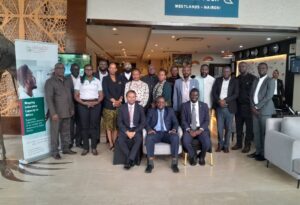Kenya Hosts ASLM and Africa CDC for GIS Laboratory Mapping Strategic Framework Validation Workshop
 This week, the African Society for Laboratory Medicine (ASLM), in collaboration with the Africa CDC, convened a meeting in Nairobi, Kenya, to review and validate the draft GIS Laboratory Mapping (LabMaP) Strategic Framework. This initiative aims to establish a system for collecting, storing, and analyzing GIS-linked data on laboratory capacity, systems, and networks across Africa. LabMaP offers a solution for countries prepared to inventory geo-located information on their laboratory systems, supporting evidence-based decision-making for health systems strengthening.
This week, the African Society for Laboratory Medicine (ASLM), in collaboration with the Africa CDC, convened a meeting in Nairobi, Kenya, to review and validate the draft GIS Laboratory Mapping (LabMaP) Strategic Framework. This initiative aims to establish a system for collecting, storing, and analyzing GIS-linked data on laboratory capacity, systems, and networks across Africa. LabMaP offers a solution for countries prepared to inventory geo-located information on their laboratory systems, supporting evidence-based decision-making for health systems strengthening.
Participants included laboratory directors from Guinea Conakry, Sierra Leone, Mozambique, Cameroon, Zimbabwe, Zambia, Uganda, and Burkina Faso. This validation meeting follows an initial gathering held in Gaborone, Botswana, in July 2024, where stakeholders drafted the LabMaP Strategic Framework.
Dr. Talkmore Maruta, ASLM’s Director of Programs, emphasized the critical timing of this initiative, stating, “The Strategic Framework for Mapping Laboratory Capacity in Africa aligns with ASLM’s five-year strategy focused on Network and Laboratory Systems Strengthening.” He highlighted that while 27 countries have been mapped, only three countries currently have at least 90% of their expected labs mapped, underscoring the need for continued efforts. “This strategic document will be key to increasing the coverage of lab mapping across the continent,” Dr. Maruta added.
Major Bernard Bwalya from Zambia’s Ministry of Health noted the progress of LabMaP, sharing that their journey has evolved through two phases, during which they collaborated with One Health sectors, including veterinary and private laboratories, to develop capacity-building interventions. These efforts include establishing national calibration centers, operationalizing a test menu by tier, and implementing key performance measures for ongoing monitoring and review.
Dr. Felix Pinto from Mozambique’s Ministry of Health reflected on LabMaP’s impact on strategic planning, stating, “Before LabMaP, our strategic planning was largely based on brainstorming sessions, which often left out key areas. Moving forward, Mozambique will review its current Laboratory Strategic Framework with insights gained from LabMaP.”
The validation workshop in Nairobi is shaping LabMaP’s strategic priorities to guide the program’s second phase and accelerate the achievement of ASLM’s goal of strengthening laboratory systems across Africa. This initiative represents a significant step forward in building sustainable laboratory networks essential for health resilience on the continent.
